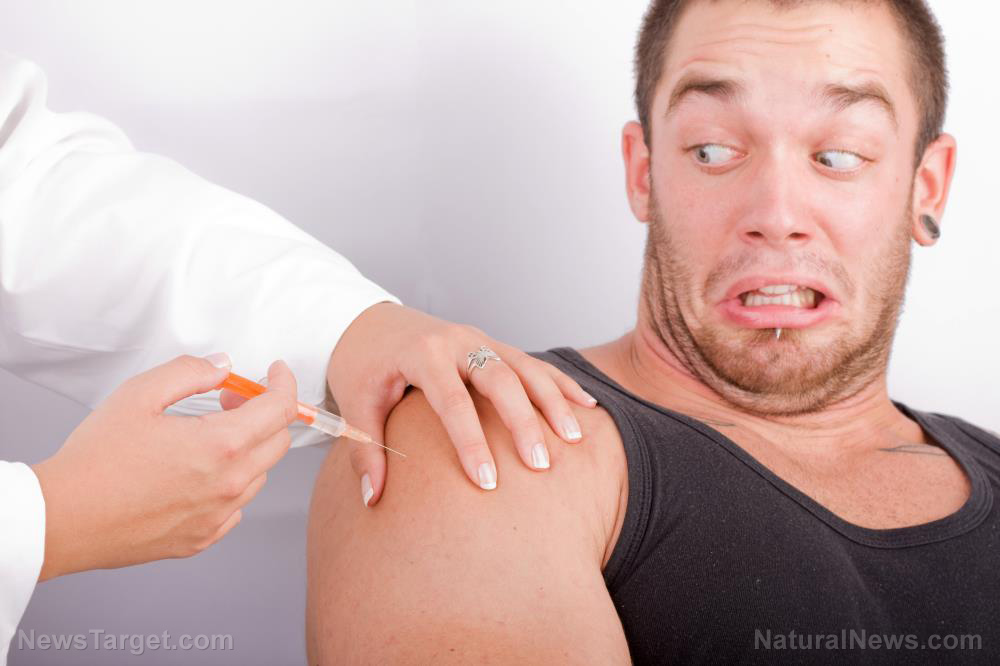Study: mRNA vaccines more likely to put recipients at risk of serious injury than protect them from COVID-19
06/22/2022 / By Belle Carter

A pre-print paper by British Medical Journal (BMJ) Editor Dr. Peter Doshi and colleagues found that the experimental mRNA vaccines of Pfizer and Moderna are more likely to put people in hospital with a serious adverse event than protecting them from the Wuhan coronavirus (COVID-19).
The paper titled “Serious Adverse Events of Special Interest Following mRNA Vaccination in Randomized Trials” focused on serious adverse events highlighted in a World Health Organization-endorsed “priority list of potential adverse events relevant to COVID-19 vaccines.”
Doshi and his colleagues evaluated the adverse reactions of special interest as observed in “phase III randomized trials of mRNA COVID-19 vaccines.”
They found that the Pfizer and Moderna mRNA vaccines were associated with an increased risk of serious adverse events of special interest: 10.1 events per 10,000 vaccinated for Pfizer and 15.1 events per 10,000 for Moderna. When combined, the mRNA vaccines were associated with an increased risk of 12.5 per 10,000 vaccinated.
The research stated that this level of increased risk post-vaccine is greater than the risk reduction in COVID-19 hospitalization in both Pfizer and Moderna trials, which was 2.3 per 10,000 participants for Pfizer and 6.4 per 10,000 for Moderna.
This means that on this measure, the Pfizer vaccine results in a net increase in serious adverse events of 7.8 per 10,000 vaccinated and the Moderna vaccine of 8.7 per 10,000 vaccinated.
Furthermore, the authors noted that the serious adverse events analysis of the Food and Drug Administration (FDA) “included thousands of additional participants with very little follow-up, of which the large majority had only received one dose.”

“FDA also counted ‘people affected’ rather than individual events, despite there being twice as many individuals in the vaccinated group than the placebo group who experienced multiple serious adverse events,” the BMJ researchers pointed out.
They also emphasized that in July 2021, the FDA reported detecting four potential adverse events of interest following Pfizer vaccination – which include pulmonary embolism, acute myocardial infarction, immune thrombocytopenia and disseminated intravascular coagulation. The agency stated it would further investigate the findings, but no update has appeared so far.
They also noted that while the Centers for Disease Control and Prevention published a protocol in early 2021 for using proportional reporting ratios for signal detection in the Vaccine Adverse Event Reporting System database, the agency has not yet reported such a study.
The paper concluded that there is a need for formal harm-benefit analyses for COVID vaccines, taking into account the different levels of risk of serious COVID and adverse events that exist between demographic groups. Ideally, this would be based on individual participant data, though such data remain frustratingly unavailable, the BMJ analysts stated.
FDA just authorized mRNA vaccines for children as young as six months
Despite numerous evidence associating mRNA vaccines to serious harms, the FDA proceeded to grant emergency use authorization (EUA) for these vaccines to be administered to infants and toddlers. (Related: GENOCIDE: FDA officially authorizes covid vaccines for children as young as 6 months.)
Moderna’s Spikevax and Pfizer and BioNTech’s Comirnaty are now authorized for immunization of all individuals six months or older against COVID-19 in the U.S.
“We’re acutely aware of the importance of having vaccines available for our youngest children. And as we’ve seen with the older age groups, we expect that the vaccines for younger children will provide protection for the most severe outcomes of COVID-19, such as hospitalization and death,” FDA Commissioner Dr. Robert Califf told reporters on a call.
The FDA authorized a three-dose series of Pfizer for use in children six months through four years of age. Moderna gained EUA as a two-dose series for use in children aged six months to five years. The agency also authorized the use of Moderna’s COVID-19 vaccine in two more demographics: children aged six through 11 and adolescents aged 12 through 17.
The said move came two days after FDA’s vaccine advisory panel unanimously voted to recommend granting an EUA for the Moderna shots. Pfizer and Moderna are now on a level field in the COVID-19 space.
Pfizer expects to generate total sales of approximately $32 billion, while Moderna has advance purchase agreements for the supply of Spikevax and a booster worth $21 billion for 2022.
Visit VaccineDamage.news for more about the adverse effects of mRNA vaccines.
Watch the video from Health Ranger Mike Adams that talks about how mRNA vaccines can cause permanent infertility.
This video is from the Health Ranger Report channel on Brighteon.com.
More related stories:
FDA uses fraudulent data to justify pushing covid shots on infants and toddlers.
FDA committee says children as young as six need to take Moderna’s COVID injections.
Pfizer’s COVID “vaccine” responsible for hepatitis outbreak in children.
Sources include:
Submit a correction >>
Tagged Under:
adverse events, big government, Big Pharma, British Medical Journal, Comirnaty, covid-19, deception, EUA, FDA, infections, Moderna, mRNA vaccine, pandemic, Pfizer, SpikeVax, vaccine damage, vaccine injury, vaccines
This article may contain statements that reflect the opinion of the author



















